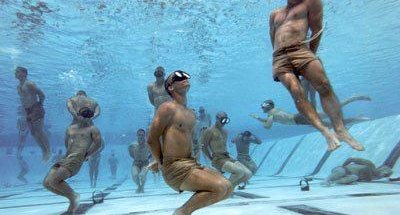PHOTO: SEAL candidates performing drown proofing, the one on the bottom right is grabbing the mask with his teeth, he’s almost done!
On the first day of the first week of SEAL training, one overly energetic and enthusiastic SEAL instructor ran us to the Combat Training Tank (CTT). The CTT is just a military term for a swimming pool, of course this one was a bit different than the normal Olympic sized pools. For starters, it has windows along three sides of it in the two deepest sections. The pool has three tiers of depths: 4’, 9’ and 15’ sections, and there are video cameras set up in various locations around the underwater windows.
Before entering the CTT, candidates are required to take a “decontamination” shower. Think of it like a large semi-rectangular carwash shower that sprays out cold water. As we huddle in “nut to butt” formation while getting “decontaminated”, our hyperactive instructor, whom I will call Instructor Psycho, was sporting a crazy Dr. Jekyll-like smirk on his face as he said: “Fellas, you’re gonna love this next evolution, it’s one of my FAV-OR-ITES (heavy emphasis on “FAV”)!”
Once out of our cold water shower, Instructor Psycho lined us up in push-up formation along the length side of the CTT. When you’re in “push-up formation” you’re looking directly down at the ground – you’re not moving your head – you’re listening while trying to block out the burn that is quickly seeping into your shoulders, back and arms. Then Instructor Psycho tells us why he’s so excited: “Boys let me explain to you the final exam of this next evolution – first you “get” to swim for 300 yards, then you “get” to float for 10 minutes, then you “get” to bob for 5 minutes then all you have to do is go pick up a mask on the bottom on the pool (9’ section) with your teeth and bring it to the side of the pool. Easy-peasy – no big deal!”
He then intentionally pauses.
What’s the Catch?
This is that silent moment where you’re trying to figure out what’s the catch. You rationalize with yourself and say something like “Wait a second, this sounds easier than the PT test I did last Friday when we swam 800 yards .” While the brain is trying to logically rationalize what you’ve just heard, a competing feeling is swelling in your gut, and it doesn’t feel good . Something’s wrong, you just don’t know what. As these thoughts and emotions are colliding inside, Instructor Psycho delivers the punch line: “Ohhh I forgot to tell you one little thing fellas , you have to do all of this while your feet are tied together and your hands are tied behind your back – Welcome to Drown Proofing!”
This is the the time when you begin to realize why he put us all in push-up formation – we can’t see the others quitting because we’re looking down. We hear Instructor Psycho saying, “Good call, I’d leave too if I didn’t feel comfortable, it’s tough, some people have died doing this. No problem, no shame in leaving, come right over here…” Then he pauses for another minute and says, “Okay, anyone else decide this next evolution isn’t for them? Now’s your chance!”
Within ten minutes of us taking a cold shower and “hanging out” in the leaning rest, Instructor Psycho got two quitters….and the evolution hadn’t even started?! Those two quit before they even tried it. It took me two years to make it to that first day of training, and I suspect it was something similar for those two, and just like that, they gave up before even trying it. Why?
They Gave Up Before Even Trying – Why?
In part, it comes down to mindsets, in particular, Fixed vs Growth Mindsets. If you look up the definition of a mindset you find several different but relatively similar in meaning concepts. Here are three that I found:
- “The established set of attitudes held by someone” (Google)
- “A fixed mental attitude or disposition that predetermines a person’s responses to and interpretations of situations – an inclination or a habit.” (Dictionary.com)
- “A person’s way of thinking and their opinions” (Cambridge English Dictionary)
The take-away of the drown-proofing story is understanding why SEAL Team does it in the first place. It’s not to prepare ourselves for walking the plank once captured by pirates – it actually has very little tactical value. However, its strategic value is immense. Here’s an evolution that completely challenges the logic of your brain. You’re thinking, “Why do this?”/What’s the point?/Is it even possible?” and you’ve got Instructor Psycho trying to appeal to the logical reasoning side of your brain, goading you to quit if you feel it’s “not safe” or it’s “not right for you”.
The real reason SEAL Training includes drown proofing is to find out how flexible your mindset is.
Is it set in stone, a fixed mindset that says “I know what I know and I know that’s not possible (or logical or practical or whatever excuse you come up with) so why even try?” Or do you have a growth mindset that says “bring it on, there’s gotta be a way to do this. I may not succeed at first but I’ll figure it out.”
One of the experts (and pioneers) on Fixed vs Growth mindsets is Stanford University psychologist, Carol Dweck, and here’s how she summarizes the differences:
“In a fixed mindset students believe their basic abilities, their intelligence, their talents, are just fixed traits. They have a certain amount and that’s that, and then their goal becomes to look smart all the time and never look dumb. In a growth mindset students understand that their talents and abilities can be developed through effort, good teaching and persistence. They don’t necessarily think everyone’s the same or anyone can be Einstein, but they believe everyone can get smarter if they work at it.”[5]
The reason I’m spending the time discussing Fixed vs Growth mindsets is to prepare you for Part Two of “Awful vs Awesome”, because you’re going to see a leadership chart and you may very well say to yourself “Hey – I’m more in the ‘Awful’ category than the ‘Awesome’ category.” And that’s okay, because we’re all human and we are ALL not perfect! (By the way, I believe we were built that way to ensure that we work together because none of us can do it all, but together we can make greatness happen.) The point is…
Awful Leaders have a Fixed Mindset
Awful leaders are not even willing to try. They’ve essentially given up on themselves because somewhere along their journey they have been convinced that they can’t change or they won’t change.
Awesome Leaders have a Growth Mindset
Awesome leaders are in a constant state of learning and look at others as learning opportunities. They know they won’t always get it right, but they’ll figure it out and make it right. Remember this mindset when you start reading Part Two of Awful vs Awesome, because leaders aren’t born, they are made. The journey of helping yourself starts from learning from others, and doing that means you’re embracing a growth mindset.
Onward and upward –
Always,
Alden
P.S. If you haven’t already done so, join me on Linked In!





